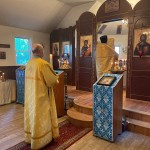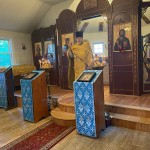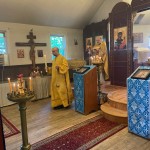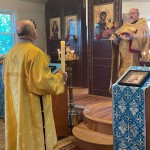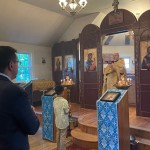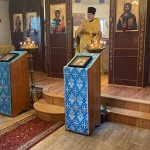On August 27, on the 12th Sunday after Pentecost, the Prefeast of the Dormition of the Most Holy Mother of God, our Rector, Archpriest Igor Tarasov served the Divine Liturgy at St. George Church. After the reading from the Holy Gospel he preached the following homily:
“Dear brothers and sisters in Christ! Every Sunday is a celebration of the Resurrection of Christ. Today’s Epistle lesson is reminding us of that very important miracle of our Lord’s victory over death. St. Paul is writing that “Christ died for our sins…, was buried, and that He rose again the third day according to the Scriptures.” (1 Cor. 15, 3-4). St. Paul further tells us that Christ’s Resurrection is confirmed by a number of witnesses to whom the risen Lord appeared. Then, last of all, the risen Christ appeared to St. Paul”.
“During Paschal season we greet each other by the joyful words, “Christ is risen!” But how can we believe it is true; how can we admit that Christ is truly risen? St. Paul calls the witnesses. This is his method to convince the Corinthians. He refers to five appearances of Jesus after His Resurrection: to Peter, to the twelve Apostles, to over of 500 brethren, to James and all the Apostles and then to himself. St. Paul considers Christ’s appearance to him on the road to Damascus an appearance of the same kind as all other appearances of the risen Christ to His Disciples, even though it happened 6 years after these appearances. 6 years passed after Christ Resurrection and His Ascension into heaven. Yet St. Paul places his special experience of meeting Christ on the Damascus Road in the same row as the appearances of the risen Lord. He does so because for him it was a real Resurrection experience. That appearance changed the history of many nations. It transformed a fanatical persecutor into Christ’s greatest friend; it gave Christianity a great teacher; it gave the New Testament its chief author; it granted many people, especially Gentiles, their first preacher of the Gospel, their true Apostle”.
“St. Paul says, “Last of all He was seen by me also, as by one born out of due time” (1 Cor. 15, 8). Paul did not belong to the original group of Disciples. He came after them. Thus he says that he is “the least of the Apostles… not worthy to be called an Apostle” because he “persecuted the Church of God” (1 Cor. 15, 9). He called himself the chief of the sinners. Yet he admitted that Christ had chosen to reveal Himself to him. He felt it was not due to his merits, but an act of pure grace and mercy on the part of God. He writes, “But by the grace of God I am what I am” (1 Cor. 15, 10)”.
“The early Church decreed that no one could be called an Apostle if he had not personally seen the risen Jesus. St. Paul always insisted that he had this essential qualification to testify from personal knowledge of Jesus. He utters, “Am I not an Apostle? Am I not free? Have I not seen Jesus Christ our Lord?” (1 Cor. 9, 1). How could he see Jesus Christ if he was not among the Apostles at the time when Jesus was on earth? Only by his very special, intimate and real experience of meeting the Lord on the road to Damascus. Finally, Jesus did appear to Paul, appeared last of all, as to “one born out of due time””.
“Let us remember that “Jesus Christ is the same yesterday, today and forever” (Hebr. 13, 8). If He came then, He comes now. Jesus comes to us now in our sense of sinfulness to forgive us, in our grief to comfort us, in our doubts to give us hope, in our fear to uphold us. He is not just a great Teacher and a beautiful example. He is the Son of God, the risen Lord, the Conqueror of death. He appears to us Christians and may appear to unbelievers to make them believers. And let us remember that when Christ does appear to the people, He does it as a pure grace. We can never deserve His attention. We are not worthy of His appearance. However, out of His love for mankind and His rich mercy He blesses us with His coming. This is a gift of God. It is priceless, but we receive it free of charge. This is important to know: the divine grace is not given for certain good deeds or merits, but freely. It is a special gift to the sinful and unworthy men. But it is able to make those sinful men holy and the unworthy crowned with dignity. It saves our souls and gives eternal life”.
“The grace of God may be bestowed any time. Some get it early, some later. This is why even a great sinner can repent and change his life. St. Paul did so. The grace may be bestowed “last of all” as happened to St. Paul”.
“Like St. Paul, let us be humble, but let us also be sure that the risen Lord may bestow His grace upon us and come to us to bless and grant us eternal salvation”.
During preparation for Holy Communion he choir nicely performed hymns dedicated to Venerable Theodosius of the Caves whose memory was celebrated on that day.
After the dismissal of the Liturgy the Rector made some announcements regarding the coming feast of the Dormition and our schedule for the next month.

